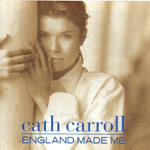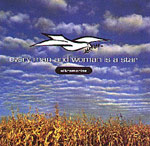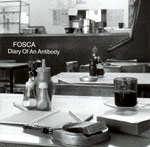Garlands of Razor-Wire and Poppies
| |

| I said recently that Sundazed was the greatest label on earth right now, and although that still holds true, if truth be told they'd have to share the title with LTM, whose output is, if less prodigious in quantity, at least the equal in quality. For proof look no further than the most recent two releases, each of which make a reappearance a decade after their initial release. Cath Carroll is a name I've known a fair bit over the past fifteen or so years without actually hearing much of her recorded output. Sure, I heard some of those beguiling Hit Parade singles she sang on, notably the divine 'Meet Me In Havana', and I knew about Miaow, although I never picked up any of their records. I read her NME reviews when she wrote as Myrna Minkoff, and I know all about the obsession that terminally hip TeenBeat label boss Mark Robinson had with her back in the start of the nineties. He put her on the cover of the Milky Teeth album by his band Unrest, an album which also featured a song all about Cath that revolved around line 'Cath Carroll going to take me for a ride!'. Well, quite. Robinson also took the opportunity of releasing a couple of Cath's own singles and her second solo album True Crime Motel, which I never heard. Similarly, I never heard Cath Carroll's debut solo album, England Made Me, which appeared on Factory back in 1991. Thankfully, however, with LTM's James Nice on the case, I'm now able to rectify that situation, and report that hey, ten years ago I really did miss out on a great record. England Made Me is an album of multiple influences and directions, reflecting the fact that it was recorded in places as diverse as Sheffield, Sau Paulo, London and Chicago. As a result it's a strange, beguiling collection of slightly melancholic electro-dance and spooked bosa-nova pop; dancing in the dark with the ghosts of post-punk or flying down to Rio with razor blades and safety pins for wings. Standout tracks are the more dance-oriented tracks like 'Send Me Over', 'Subtitled' and the fabulous opener 'Moves Like You' which sound like typically fine early '90s 'dance' tunes, from a time when it seemed there were real adventurous trips being taken in that genre, before it all imploded into tedious formula. Whatever. Best of all however is the frankly scary 'Train You're On'. Recorded in Chicago with Steve Albini and ex-Big Black guitarist Santiago Durango, this is one stormy fiesta freakout, full of whistles and jumping, clattering beats punctuated by Durango's fierce guitar. Imagine a Mardi Gras float festooned in garlands of razor-wire and poppies populated by an early A Certain Ratio and you'd be close, but still a million miles away. It's really that good. |

| The second LTM release is the acknowledged classic of chilled electronica that is Ultramarine's Every Man and Woman Is A Star. It's a testament to the timeless quality of the album, and of the way time has accelerated madly over the past decade that it feels like only yesterday that I was first struck dumb by hearing the single 'Stella' back in 1991. I've said it before of course and will doubtless say it again, but the start of the '90s was really a wonderful time for music; a time where the possibilities offered by 'dance' music in the wake of the Acid revolution really blossomed into wondrous flower. Like the post-punk boom of the late '70s and early '80s, the early '90s gave us a whole host of artists who seemed high on the spirit of true adventurous discovery, mixing and blending styles and approaches to make things that often sounded unique and dynamically uplifting. Ultramarine were one such bunch of artists, who with EMAWIAS made an astonishing leap forward from the somewhat stodgy funk workout of their previous Folk album into the outer reaches of inner and outer space. Originally released in '91 on Belgian label Les Disques Crepescule, EMAWIAS seeped into the mythology of post-Rave Britain and was picked up for a UK release a year later by Rough Trade when it was instantly hailed by all and sundry as an undeniable classic. Over the years the UK music press of course has famously failed to hit the right targets when proclaiming genius in artists and bestowing classic status on records, but with EMAWIAS it was right on the money. Ultramarine tapped directly into the post-euphoria of post-rave and made a sound that looked upwards to heavens rather than downwards at feet tied up in the mud. They made a record that spread its wings and flew; a record that eschewed many of the more typical 'dance' and electronic influences in favour of folk overtones that reflected their love of the old Canterbury scene of Robert Wyatt and Soft Machine et al. Of course they would push this folk connection further and more explicitly on their next album United Kindgom, but it was really on EMAWIAS when the connection was at best tangential where it worked best. There were, and indeed are, so many highlights on EMAWIAS that it seems unfair to point to anything in particular, but still, that early single 'Stella' is a standout, with its spoken word vocal speaking of the glory of dance as release floating atop sequencer runs that sparkle like mountain streams running over pebbles that reflect pink, gold and turquoise; 'British Summertime' has looping piano and viscous strings, a ghostly choir and keyboards that spin around you like drops of rain caught in slow motion so you can reach and hold each one in your hand; 'Weird Gear' has what sounds like the string (?) refrain from Echo and Bunnymen's 'The Cutter' slowed to a stroll, horns that are pure Pale Fountains and Brendan Staunton telling us over and over again that 'everything you say, everything you do, is true'. Everything that seems to have been said and written about EMAWIAS is similarly true. For once, believe all the hyperbole that says this really is a classic album. Believe it when you are told that this record more than any other both defined an era and yet managed to achieve an escape velocity, allowing it to inhabit those outer reaches of the musical universe where only the finest jewels reside. |

| Now, I don't know much about Cody, but I'd hazard a guess that they have a copy of EMAWIAS somewhere in their record collection. Certainly the proof would seem to be there on their Distance Learning album for Shinkansen, which really is the most assured and gorgeous collection of electronic tinged Pop I've heard for a long time. Wistful and would-be-wanton, this album shimmers with a golden glow, caresses your spine with sunflower kisses and garlands your neck with daisy chains spiked with thimbles full of gin. Opener 'Uplift' is aptly titled, as it leaps from the speakers, grabs you by your hands and whirls you around the upper stratosphere. 'Share and Enjoy' meanwhile has the most seductive glockenspiel refrain (or is it some other, similar instrument? I really have no clue on such things) ever recorded, whilst the electro counterpoint that blips and twirls underneath is similarly magical. 'Bolero and Cipher' meanwhile has dreamy strings cascading across the soul that sound like walking through a waterfall; 'Evening Falls' is the sound of Blueboy caught in the middle of an electric substation in a thunderstorm; seven minute 'A Single Thread' a dramatic epiphany of empty aches that ends with two minutes of the most infectiously melancholic keyboard refrain wiping away tears from cheeks made of ivory. Finally, closing track 'Sentinels' strangely reminds me of the two golden retriever dogs that used to lay at the end of a driveway down by the ripped up railway tracks by the school, on the route we took on weekends to town and oblivion. I wrote about these dogs once, a long time ago. I thought about how they would one day be gone, and suggested that what I grieved for most were the sorrows yet to blight me. I don't know if that makes much sense now. I don't know if it ever did, and I don't really know how it connects with Cody, except I know somewhere inside that it does and that's enough. |

| Also on Shinkansen is a new album by Fosca. Diary of an Antibody kicks off with what is maybe the best single of the summer. 'Secret Crush on Third Trombone' is simply a marvellous throwaway three minutes of sheer unrepentant Pop, all magnificent chorus hooks and jibes at the shaky nature of growing up and old and away from your youth. As I said, it's unrepentant Pop and it does everything it says on the tin. 'Supine On The Astroturf' was a fine single too, and it's included here. It's a lovely attendant to Baxendale's anthemic 'Hanging Out With Her' of a couple of years ago, and Fosca do seem to inhabit something of the same ground as Baxendale, and indeed tucked away on the sleevenotes is a thanks to Tim Benton. I've heard it said that the cognoscenti of Indiepop tend to shun Fosca somewhat, which is probably as it should be, Dickon and company not really seeming the types to bother about cliques and fashions, aside of course from the only true clique that matters, which is the clique of the individual. Fosca make records that are all about the pain and glory of lives lived outside of the mainstream of both the mainstream and the, ahem, 'underground'. Fosca make records about not fitting in anywhere at all; about feeling totally bewildered by the nature of the contemporary world, whiling away the days and willing away the nights in a swirl of films and books and dreams of it all being somehow different. Fosca make music for the teams that meet in Caffs with Andre Gide novels tucked under their arms, and for that we should be thankful. © Alistair Fitchett 2002 |